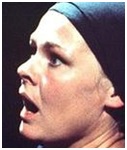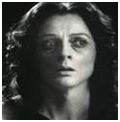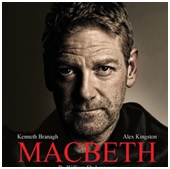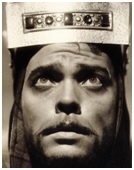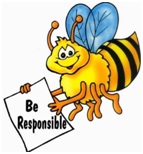|
 |
|
 |
|
|
||
Shakespeare's Macbeth - Happiness and
Success
Macbeth
Key characters Macbeth, Thane (Lord) of Glamis. Lady Macbeth, his wife. Banquo and Macduff, thanes (Scottish aristocrats). The Three Witches. Set in... 11th century Scotland.
Fun facts
The story Having helped Duncan, the king of Scotland, defeat the Norwegian army.
Macbeth and his fellow general, Banquo, meet three witches
who prophesy that Banquo’s descendants and Macbeth will become kings. This prophesy fuels Macbeth's ambition, encouraged still further by his wife, Lady Macbeth. She persuades him to murder King Duncan, while he is staying at their castle at Glamis. Macbeth (Kenneth Branagh, pictured right, in a 2013 production) hesitates approaching Duncan’s bedroom, troubled by strange hallucinations. But he kills the drugged Duncan. Then Macduff, another Scottish lord, arrives and discovers the body. Faking horror, Macbeth kills the guards whom Lady Macbeth has attempted to frame by smearing them with blood. Fearing for their own lives, Duncan’s two only sons, Donalbain and Malcolm, flee. So Macbeth becomes king and the witches’ prophesy comes true. Although Banquo thinks Macbeth might have been the murderer, he agrees to attend a banquet to celebrate Macbeth’s coronation. To silence Banquo and fearful of the witches' prophesy that his heirs will become kings, Macbeth hires assassins to kill him. But his son, Fleance, manages to escape At the banquet Macbeth is haunted by Banquo’s ghost, and Macbeth’s guilt is now suspected by some lords including Macduff. The witches then prophesy that “none of woman born shall harm Macbeth”. So Macbeth (Orson Welles, pictured right, in a 1948 film) kills Macduff’s wife and children. But Macduff:
Lady Macbeth is now:
Malcolm’s army advances and disguises itself with branches from Birnam Wood, near Macbeth’s castle. But Macbeth responds slowly to the threat, convinced of his invincibility by the witches’ latest prophesy (but they also say that this will end when Birnam Wood moves!). Lady Macbeth commits suicide (offstage) but Macbeth fights on, meeting Macduff, whom he learns was delivered by Caesarean section (so fitting the witches’ description “none of woman born”). Macduff kills him and Malcolm becomes king.
Lessons for life
1. Beware of ruthless ambition Macbeth and Lady Macbeth are prepared to kill for their ambition. He reflects that only “vaulting ambition” can overrule his troubled conscience. Lady Macbeth even says she would kill her own child, if necessary. But they both pay the price with:
“Out, damned spot; out, I say”, Lady Macbeth cries as she tries to wash Duncan’s imaginary blood off her hands.
2. You reap what you sow Lady Macbeth, one of Shakespeare’s most wicked and ambitious characters:
Her thoughts about the murders change from:
Macbeth, too, is plagued by guilt and horrendous hallucinations. So he becomes indifferent to his
3. You alone are responsible for your life It seems that Macbeth’s fate is predetermined by the witches’ prophecies. But it is his actions that condemn him, not witchcraft. So his doctor tells him that “the patient must minister to himself” In other words, Macbeth must sort out his own problems. 4. Temptation can be tempting (even to good people) Macbeth probably never thought about becoming king until the witches suggested it. He was:
But he didn’t have the moral courage to resist her evil persuasion. 5. Good accompanies evil Macbeth (see point 4) and even Lady Macbeth are not totally evil (leading to their tortured consciences). She refuses to kill Duncan herself, because he reminded her of her father.
6. Put virtue into action Duncan is:
Just before his murder, he:
Banquo:
Banquo's only weakness is that he fails to act quickly enough against Macbeth, because he doesn't see his bad side.
7. One bad thing leads to another Macbeth hoped that one murder would be enough (“the be-all and end-all”), but one killing led to another. “Blood will have blood”, he says. 8. Trust can be misplaced Duncan and Banquo:
Just before his murder, Duncan is completely deceived by Lady Macbeth’s “thoughtfulness”. 9. Envy is evil Macbeth:
Macbeth (Ian McKellen, Gandalf in the Lord of the Rings films) and Lady Macbeth (Judi Dench) are pictured right above in a 1978 production. 10. Alcohol and sex don't mix! “It provokes the desire, but it takes away the performance” , the porter tells Macduff.
Key quotes on ethics and evil Screw your courage to the sticking-place and we’ll not fail, Lady Macbeth. Is this a dagger I see before me, the handle toward my hand?, Macbeth. We but teach bloody instructions which, being taught, return to plague the inventor, Macbeth. Fair is foul, and foul is fair, the Witches Double, double toil and trouble; Fire burn, and cauldron bubble, the Witches. Blood will have blood, Macbeth. Key quote on success It [life] is a tale told by an idiot, full of sound and fury, signifying nothing, Macbeth.
Key quote on decision making Things without all remedy should be without regard, Lady Macbeth.
Key quotes on stress and pain What’s done cannot be undone, Lady Macbeth. The night is long that never finds the day, Malcolm. Give sorrow words: the grief that does not speak whispers the o’er-fraught heart, and bids it break, Malcolm.
Key quote on relationships There’s daggers in men’s smiles, Donalbain.
Key quote on fear When our actions do not, our fears do make us traitors, Lady Macduff. |
|
|
||
|
|
||
| Copyright © wisdomtowin.com 2025 All Rights Reserved | ||
|



